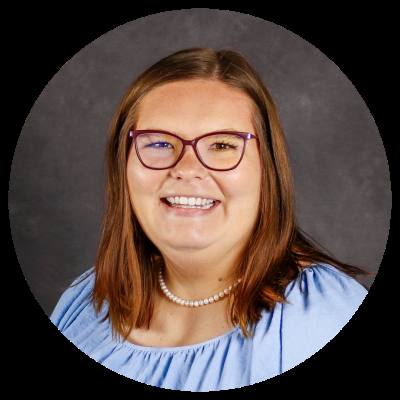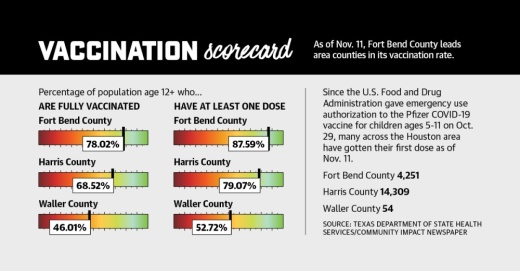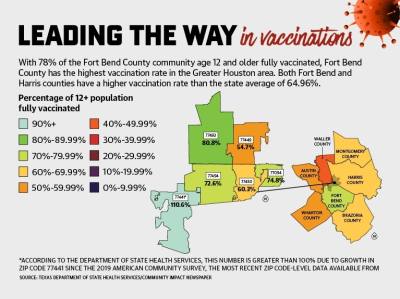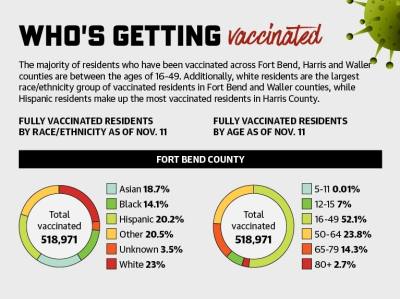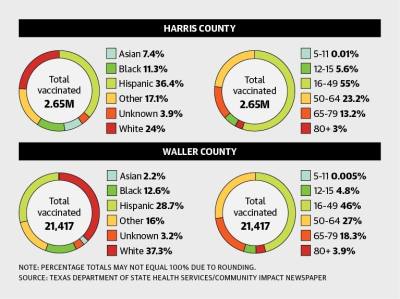Fort Bend County is the eighth-most vaccinated county in the state with more than 78% of its residents age 12 and older fully vaccinated—leading other Katy-area counties in vaccine rates. Harris and Waller counties have fully vaccinated 68.5% and 46% of their age 12 and older population as of Nov. 11.
The U.S. Food and Drug Administration and Centers for Disease Control and Prevention recommended the vaccine for ages 5-11 on Nov. 2. Since then, 18,614 people in the age group across the three counties had received at least one dose as of Nov. 11.
Fort Bend County Judge KP George attributed the county’s high vaccination rate to a number of factors, including its residents, who he said have responded to outreach efforts.
“It’s very much [a team effort] where we were able to do a lot of things and guide people through the right channels,” he said. “The end results look like we are doing exceptionally well compared to many counties.”
In late August, Harris County formed a 69-position COVID-19 response division to handle coronavirus testing, vaccination and outreach efforts countywide for the next two years. The $17 million division is being funded through state and federal relief grants.
“In general, [Harris County is] not at the point where we need to be [in terms of vaccination rate] across most ZIP codes,” said Jennifer Kiger, the director of the COVID-19 response division.
Still, the Houston area is coming off a so-called “third wave” of cases, driven largely by the delta variant’s transmission among mainly unvaccinated individuals, health care officials said.
Fort Bend County Health & Human Services recorded the highest number of cases in one day since the pandemic began at 1,499 on Sept. 8. Similarly, Harris County reported its highest one-day new-case high of approximately 3,900 on Aug. 18. As of Nov. 11, Harris County had 3,796 cases and Fort Bend County had 1,529 cases.
“It’s extremely sad to have such a wonderful tool available for us [in the vaccine], and for whatever reason, people don’t take advantage of it,” said Kathryn Tart, dean of the University of Houston’s College of Nursing.
Combating coronavirus
Since Texas expanded eligibility for the vaccine in mid-May to everyone age 12 and older, both FBCHHS and HCPH have been working to make the vaccine as available as possible by establishing mass vaccination sites and mobile clinics, officials said.
“Across the nation and here locally, vaccine uptake has decreased,” FBCHHS Director Dr. Jacquelyn Minter said in an email. “Although vaccinations are now more readily available, there are still those without easy access to commercial locations due to transportation, technology or working hours. Others are hesitant because of an unclear understanding regarding the vaccine’s safety, and others have heard incorrect or confusing information.”
Minter said 1.3% of the cases reported to her department occurred in fully vaccinated individuals—people who are also less likely to be hospitalized or die from the virus, she said.
Dr. Linda Yancey, an infectious disease specialist at Houston Methodist West Hospital near Katy, said this third wave of hospitalizations was made up of mostly unvaccinated people. She described the latest influx of patients as “heartbreaking,” saying it consisted of people in their 20s, 30s and 40s who she believes would not be hospitalized if they had taken the vaccine.
“All the folks we’re seeing with severe illness are unvaccinated people. Everybody in the [intensive care unit], everybody on a ventilator—these are all unvaccinated people,” Yancey said. “This wave was entirely preventable. We would be business as usual with a handful of cases if the community had been fully vaccinated.”
Furthermore, reaching herd immunity—when a large portion of a community is immune through vaccination or exposure—is becoming increasingly unattainable, Kiger said.
“[Herd immunity is] getting harder and harder to achieve because of the variants and low vaccination rates,” Kiger said. “What we’re trying to achieve now is ... a lower hospitalization rate, low morbidity/mortality rates and ... less community spread.”
Vaccine outreach
Despite Fort Bend County’s relatively high vaccination rate, officials said vaccine outreach remains a top priority. Throughout spring and summer, county officials approved spending federal aid to promote vaccine outreach, which has led to more people getting the shot, officials said.
In April, the county unveiled its Mobile Health Unit, which was funded through the Coronavirus Aid, Relief and Economic Security Act and brings vaccines to underserved areas. As of Oct. 20, the unit had provided about 9,000 vaccine doses to residents. While Fort Bend County was unable to provide a breakdown of funds spent on vaccination campaigns, George’s office said most of the efforts were funded using Federal Emergency Management Agency dollars along with more than $8 million of CARES Act funding and more than $8 million from the American Rescue Plan Act.
The county has also used federal relief funding to provide aid to those affected by the pandemic with child care, mortgage, small-business and employment programs.
Fulshear Mayor Aaron Groff said while he applauds the county’s efforts to prioritize vaccine distribution, more outreach spending may not be needed.
“If people aren’t vaccinated today, it’s not because they don’t have access,” Groff said. “It’s because they’re making that choice not to, and so we don’t need to be continuing to spend dollars on initiatives to force something on people that are actively choosing not to participate.”
Fort Bend County has stopped short of implementing incentives for people who get a shot—a strategy HCPH deployed in hopes of driving up vaccination rates.
In May, Harris County officials launched a 10-week scholarship program, during which a $5,000 scholarship was awarded each week to a student who received a vaccine from a HCPH site. Kiger said HCPH has vaccinated over 25,000 residents under the age of 18, some of which can be attributed to the scholarship program.
In the same spirit, HCPH launched a second incentive program Aug. 17 in which anyone who received a COVID-19 vaccine at a HCPH site through Aug. 31 would receive $100. Citing a 706% increase in daily vaccinations, officials expanded the program to include all medical providers in the county. The program was later extended to run through Sept. 14.
“It’s important to do everything we can to encourage people to get vaccinated,” Kiger said. “We know that some people aren’t able to get vaccinated because they have to take time off work to go do it, so this $100 incentive program was able to help in those scenarios.”
George said Fort Bend County officials have considered incentives, but the county’s high vaccination rate has not justified their need.
Next steps in vaccination
On Nov. 4, the Biden administration rolled out two vaccination rules. The first, issued by the Occupational Safety and Health Administration, requires employers with more than 100 workers to ensure employees are fully vaccinated by Jan. 4 or that they test negative once a week. The other mandate requires staff of medical facilities receiving federal funds to be vaccinated by the same day. These rules have been paused by a federal appeals court after a some states, including Texas, argued government overreach.
Gov. Greg Abbott previously issued an executive order banning COVID-19 vaccine mandates Oct. 11. Under the order, no entity can make the vaccine mandatory, including for customers or employees, punishable by a $1,000 maximum fine.
“[Vaccine mandates are] a tried and true public health tool, and they work,” Yancey said. “We’ve been using it for hundreds of years because it works.”
Additionally, Kiger said the COVID-19 division is ramping up its efforts as many fully vaccinated residents will soon be eligible for booster shots.
“We’re able [to see when] patients who got their first and second dose from us will be due for their [booster] dose, and so we’re planning appropriately for that,” she said.
With ages 5-11 now eligible for the vaccine, Yancey said she encourages parents to get their kids vaccinated.
“It is so important to get our kids protected,” she said. “The goal is to end this pandemic, and the only way we’re going to get there is through vaccinating the general public.”
Hannah Zedaker contributed to this report.


